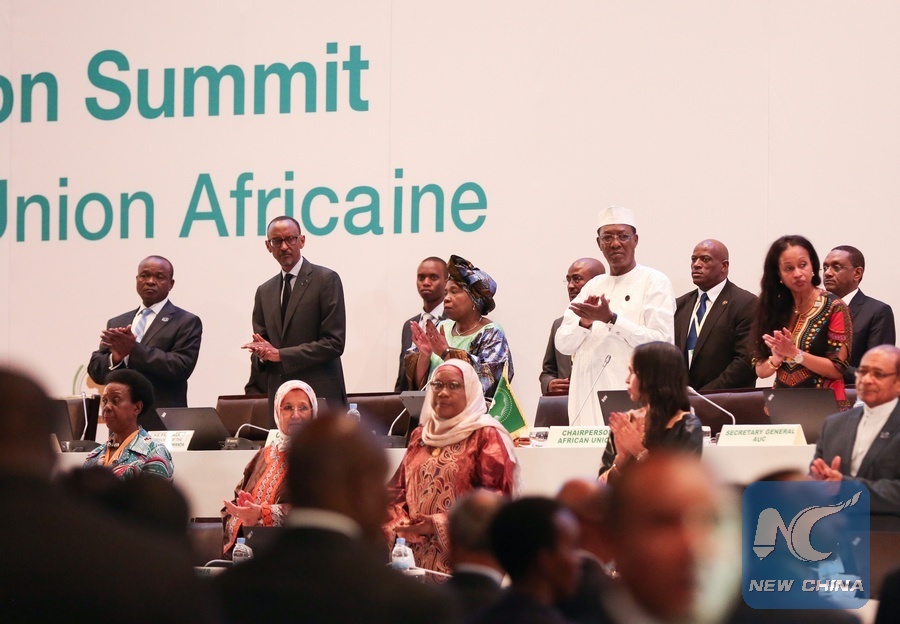 Rotating African Union chairperson Idriss Deby, President of the Republic of Chad, addresses the opening ceremony of the 27th ordinary session of the AU Heads of States in Kigali, capital of Rwanda, on July 17, 2016. (Xinhua/Pan Siwei)
Rotating African Union chairperson Idriss Deby, President of the Republic of Chad, addresses the opening ceremony of the 27th ordinary session of the AU Heads of States in Kigali, capital of Rwanda, on July 17, 2016. (Xinhua/Pan Siwei)
KIGALI, July 19 (Xinhua) -- African heads of state and government have adopted a comprehensive new roadmap to eliminate malaria in the continent by 2030.
The leaders endorsed the new framework which outlines a pathway to eliminate malaria incidence and mortality, and prevent its transmission and re-establishment in all countries by 2030.
In a gradual process, the framework also outlines milestones and targets, with the aim to reduce malaria incidence and mortality rates by at least 40 percent by 2020, and 75 percent by 2025.
"We are calling for increased external and domestic funding and commitments that could help save the continent from unnecessary deaths," Idriss Deby, Chad's President and also chair of the African Union, chair of African Leaders Malaria Alliance (ALMA) said during the ongoing 27th African Union (AU) Summit in Kigali, Rwanda.
Deby said that Africa-wide consensus by leaders indicate that malaria will soon be eliminated from the continent.
Malaria is the leading cause of morbidity and children deaths in the continent and is mainly common in countries within the tropics during rainy seasons.
He urged countries to redouble their efforts to sustain existing donor funding and ramp up domestic resources to ensure the success of the roadmap and implementation of innovative health solutions to eliminate malaria.
According to ALMA, malaria mortality rates in Africa have fallen by 66 percent since 2000 among all age groups and by 71 percent among children under 5 years old.
Annual malaria deaths in Africa have decreased from an estimated 764,000 in 2000 to 395,000 in 2015.
But malaria still remains one of the top causes of morbidity in pregnant women and mortality in children under 5.
 President of the Republic of Chad and rotating African Union chairperson Idriss Deby (4th R, on stage), President of Rwanda Paul Kagame (2nd L, on stage), Chairperson of the African Union Commission (AUC) Nkosazana Dlamini Zuma (4th L, on stage) and Deputy Chairperson of the AUC Erastus Mwencha (1st L, on stage) attend the opening ceremony of the 27th ordinary session of the AU Heads of States, in Kigali, Rwanda, July 17, 2016. (Xinhua/Pan Siwei)
President of the Republic of Chad and rotating African Union chairperson Idriss Deby (4th R, on stage), President of Rwanda Paul Kagame (2nd L, on stage), Chairperson of the African Union Commission (AUC) Nkosazana Dlamini Zuma (4th L, on stage) and Deputy Chairperson of the AUC Erastus Mwencha (1st L, on stage) attend the opening ceremony of the 27th ordinary session of the AU Heads of States, in Kigali, Rwanda, July 17, 2016. (Xinhua/Pan Siwei)
Since its founding in 2009, ALMA has supported countries to keep malaria high on the national and international development agendas.
"African leadership is our most powerful weapon in the war against malaria," said Joy Phumaphi, the Executive Secretary of ALMA told Xinhua in an Interview.
She observed that in renewing their commitment to fight malaria and endorsing a framework, African leaders have come a step closer to an Africa free of malaria.
"The ultimate goal is the elimination of malaria incidence and mortality, and to prevent its transmission and re-establishment in all countries by 2030 through a sustained commitment to finish the fight," she noted.
She hailed Swaziland as the only country in Africa that has met over 15 percent of requirements by allocating five percent of its Domestic Gross Product (GDP) towards malaria intervention and has also met the World Health Organization (WHO) recommendations.
"Eight countries in Southern Africa are also making strides towards eliminating malaria through their joint elimination group," she reveled.
Phumaphi said that the new framework, which also defines continent-wide goals for HIV/Aids and TB, focuses on the guiding principles of country ownership and leadership, financial and political commitment, equal access to health services for vulnerable and hard-to-reach populations, and robust malaria surveillance and response systems.

